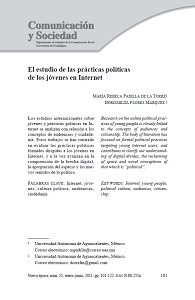El estudio de las prácticas políticas de los jóvenes en Internet
DOI:
https://doi.org/10.32870/cys.v0i15.1141Palabras clave:
Internet, jóvenes, cultura política, audiencias, ciudadaníaResumen
Los estudios internacionales sobre jóvenes y prácticas políticas en Internet se analizan con relación a los conceptos de audiencias y ciudadanía. Estos trabajos se han centrado en evaluar las prácticas políticas formales dirigidas a los jóvenes en Internet, y a la vez avanzan en la comprensión de la brecha digital, la apropiación del espacio y los nuevos sentidos de lo político.Descargas
Citas
Alvermann, D. E. (2004). Media, information communication technologies, and youth literacies: A cultural studies perspective. American Behavioral Scientist, 48, 78–83.
Asociación Mexicana de Internet–AMIPCI (2010). Estudio AMIPCI 2009 sobre hábitos de los usuarios de Internet en México. Recuperado el 19 de mayo de 2010 dehttp://www.amipci.org.mx/estudios/temp/Estudiofinalversion1110–0198933001274287495OB.pdf
Banaji, S. (2008). The trouble with civic: A snapshot of young people's civic and political engagements in twenty–first–century democracies. Journal of Youth Studies, 11 (5), 543–560.
Bakardjieva, M. (2010). The Internet and subactivism. Cultivating young citizenship in everyday life. En T. Olsson & P. Dahlgren (Eds.), Young people, ICTS and democracy. Theories, policies, and websites (pp. 129–146). Gotemburgo, Suecia: University of Gothenburg–Nordicom.
Beck, U. (1997). The reinvention of politics: Rethinking modernity in the global social order. Cambridge: Political Press.
Blasco, M. & Hansen, H. K. (2006). Cosmopolitan aspirations: New media, citizenship education and youth in Latin America. Citizenship Studies, 10 (4), 469–488.
Cheong, P. H. (2008). The young and techless? Investigating Internet use and problem–solving behaviors of young adults in Singapore. New Media & Society, 10, 771–791.
Clark, L. S. (2003). Challenges of social good in the world of Grand Theft Auto and Barbie: A case study of a community computer center for youth. New Media & Society, 5 (1), 95–116.
Coleman, S. (2006). Digital voices and analogue citizenship. Bridging the gap between young people and the democratic process. Public Policy Research, 13 (4), 257–261.
Elias, N. & Lemish, D. (2009). Spinning the web of identity: The roles of the Internet in the lives of immigrant adolescents. New Media & Society, 11, 533–551.
D'Haenens, L., Koeman, J. & Saeys, F. (2007). Digital citizenship among ethnic minority youths in the Netherlands and Flanders. New Media & Society, 9 (2), 278–299.
Falkheimer, J. & Jansson, A. (Eds.). (2006). Geographies of communication. The spatial turn in media studies. Gotemburgo, Suecia: University of Gothenburg–Nordicom.
Feldman, L., Pasek, J., Romer, D. & Jamieson, K. H. (2007). Identifying best practices in civic education: Lessong from the student voices program. American Journal of Education, 114, 75–100.
Ferry, J. (1998). Las transformaciones de la publicidad política. En J. M. Ferry, D. Wolton, M. R. Segura et al. El nuevo espacio público (pp. 13–27). Barcelona: Gedisa.
Harris, A. (2008). Yount women, late modern politics, and the participatory possibilities of online cultures.Journal of Youth Studies, 11 (5), 481–495.
Hermes, J. (2006). Citizenship in the age of the Internet. European Journal of Communication, 21 (3), 295–309.
Hodkinson, P.l & Lincoln, S. (2008). Online journals as virtual bedrooms?: Young people, identity and personal space. Young, 16 (1), 27–46.
Hwang, J. M., Cheong, P. H. & Feeley, T. H. (2009). Being young and feeling blue in Taiwan: Examining adolescent depressive mood and online and offline activities. New Media & Society, 11 (7), 1–21.
Instituto Nacional de Estadística, Geografía e Informática–INEGI (2008). Usuarios de Internet por países seleccionados, 1998 a 2008. Recuperado el 4 de enero de 2010 dehttp://www.inegi.org.mx/est/contenidos/espanol/rutinas/ept.asp?t=tinf142&s=est&c=4870
Instituto Nacional de Estadística, Geografía e Informática–INEGI (2009). Usuarios de las tecnologías de información, 2001 a 2009. Recuperado el 4 de enero de 2010 dehttp://www.inegi.org.mx/est/contenidos/espanol/rutinas/ept.asp?t=tinf204&s=est&c=5931
Jang, W. Y. (2005). Analysis of the mediating effect of political discussion and Internet use variables on the relationship between civic education and discursive participation: A structural equations framework. Ponencia presentada en la 55th Annual Conference of the International Communication Association. Nueva York: ICA.
Kaare, B. H., Brandtzaeg, P. B., Heim, J. & Endestad, T. (2007). In the borderland between family orientation and peer culture: The use of communication technologies among Norwegian teens. New Media & Society, 9 (4), 603–624.
Lee, L. (2008). The impact of young people's Internet use on class boundaries and life trajectories. Sociology, 42(1), 137–153.
Livingstone, S. (2003). Children's use of the Internet: Reflections on the emerging research agenda. New Media & Society, 5 (2), 147–166.
Livingstone, S. (2004). The challenge of changing audiences. Or what is the audience researcher to do in the age of Internet? European Journal of Communication, 19 (1), 75–86.
Livingstone, S. (2007). The challenge of engaging youth online. Contrasting producers' and teenagers' interpretations of websites. European Journal of Communication, 22, 165–184.
Livingstone, S. (2008). Taking risky opportunities in youthful content creation: Teenagers' use of social networking sites for intimacy, privacy and self–expression. New Media & Society, 10 (3), 393–411.
Livingstone, S. & Helsper, E. (2007). Gradations in digital inclusion: Children, young people and the digital divide. New Media & Society, 9 (4), 671–696.
Markham, A. & Baym, N. (2009). Internet inquiry. Conversations about method. Thousand Oaks, CA:SAGE.
Martín–Barbero, J. (2006). A Latin American perspective on communication/cultural mediation. Global Media and Communication, 2 (3), 279–297.
Martín–Barbero, J. (2008) Jóvenes: desorden cultural y palimpsestos de identidad. En H. Cubides, M. Laverde & C. Valderrama (Coords.), Viviendo a toda. Jóvenes, territorios culturales y nuevas sensibilidades (pp. 22–37). Colombia: Siglo del Hombre Editores.
Olsson, T. (2008a). The practices of Internet networking–a resource for alternative political movements.Information, Communication & Society, 11 (5), 659–674.
Olsson, T. (2008b). For activists, for potential voters, for consumers: Three modes of producing the civic web.Journal of Youth Studies, 11 (5), 497–512.
Orgad, S. (2006). The cultural dimensions of online communication: A study of breast cancer patients' Internet spaces. New Media & Society, 8 (6), 877–899.
Padilla, R. (2007). Vivir con los medios, la textura mediática que envuelve la vida cotidiana. En G. Zalpa & M. E. Patiño (Coords.), La vida cotidiana. Prácticas, lugares y momentos (pp. 57–84). Aguascalientes: UAA.
Padilla, R. (2008). Tecnologías mediáticas y la permanente reconfiguración del sensorium. Su estudio en el marco de las ciencias sociales. En R. Reguillo (Coord.), Territorios en reconfiguración. Perspectivas situadas en torno a la interdisciplinariedad. Cuadernos del DECS (pp.131–148). Tlaquepaque, Jalisco: ITESO.
Padilla, R. (2009). Perfiles socioculturales de ciudadanía. Identidades urbanas y geografías mediáticas. Estudio en cinco escenarios en la ciudad de Aguascalientes. Tesis doctoral. Tlaquepaque, Jalisco: ITESO.
Padilla, R. & Flores, D. (2010). Ciudadanía política en la red. Análisis sociocultural en el uso de la Internet en prácticas políticas entre jóvenes universitarios. Proyecto de investigación. Aguascalientes: UAA.
Reguillo, R. (2003). Ciudadanías juveniles en América Latina. Última Década, 19, 1–20.
Söderström, S. (2009). Offline social ties and online use of computers: A study of disabled youth and their use of ICT advances. New Media & Society, 11 (5), 709–727.
Tully, C. J. (2003). Growing up in technological worlds: How modern technologies shape the everyday lives of young people. Bulletin of Science, Technology & Society, 23 (6), 444–456.
Umrani, F. & Ghadially, R. (2008). Gender and decision–making in technology adoption among youth: A study of computer learners in India. Psychology & Developing Societies, 20 (2), 209–227.
Van Lieshout, M. & Aarts, N. (2008). Youth and immigrants' perspectives on public spaces. Space and Culture,11 (4), 497–513.
Van Zoonen, L. (2005). Entertaining the citizen: When politics and popular cultura converge. Lanham, Maryland, EE.UU.: Rowman & Littlefeld.
Ward, J. (2005). An opportunity for engagement in cyberspace: Political youth web sites during the 2004 European Parliament election campaign. Information Polity, 10, 233–246.
Wilska, T. & Pedrozo, S. (2007). New technology and young people's consumer identities. A comparative study between Finland and Brazil. Young, 15 (4), 343–368.
Wilson, B. & Atkinson, M. (2005). Rave and straightedge, the virtual and the real. Exploring online and offine experiences in Canadian youth subcultures. Youth & Society, 36 (3), 276–311.
Wu, J. (2009). Facebook politics: An exploratory study of American youth's political engagement during the 2008 presidential election. Ponencia presentada en la 59th Annual Conference of the International Communication Association. Chicago: ICA.
Xenos, M. & Bennett, W. L. (2007). The disconnection in online politics. The youth political web sphere and us election sites, 2002–2004. Information, Communication & Society, 10 (4), 443–464.
Xenos, M. & Kyoung, K. (2008). Rocking the vote and more: An experimental study of the impact of youth political portals. Journal of Information Technology & Politics, 5(2), 175–189.
Yang, K. W. (2007). Organizing MySpace: Youth walkouts, pleasure, politics, and new media. Educational Foundations, 21 (1–2), 9–28.

Descargas
Publicado
Cómo citar
Número
Sección
Licencia
Los autores/as que publiquen en esta revista aceptan las siguientes condiciones:
De acuerdo con la legislación de derechos de autor, los autores conservan los derechos de autoría y otorgan a Comunicación y Sociedad el derecho de primera comunicación pública de la obra. Comunicación y Sociedad no realiza cargos a los autores por enviar y procesar artículos para su publicación.
Los autores/as pueden realizar otros acuerdos contractuales independientes y adicionales para la distribución no exclusiva de la versión del artículo publicado en Comunicación y Sociedad (por ejemplo incluirlo en un repositorio institucional o publicarlo en un libro) siempre que indiquen claramente que el trabajo se publicó por primera vez en Comunicación y Sociedad.










